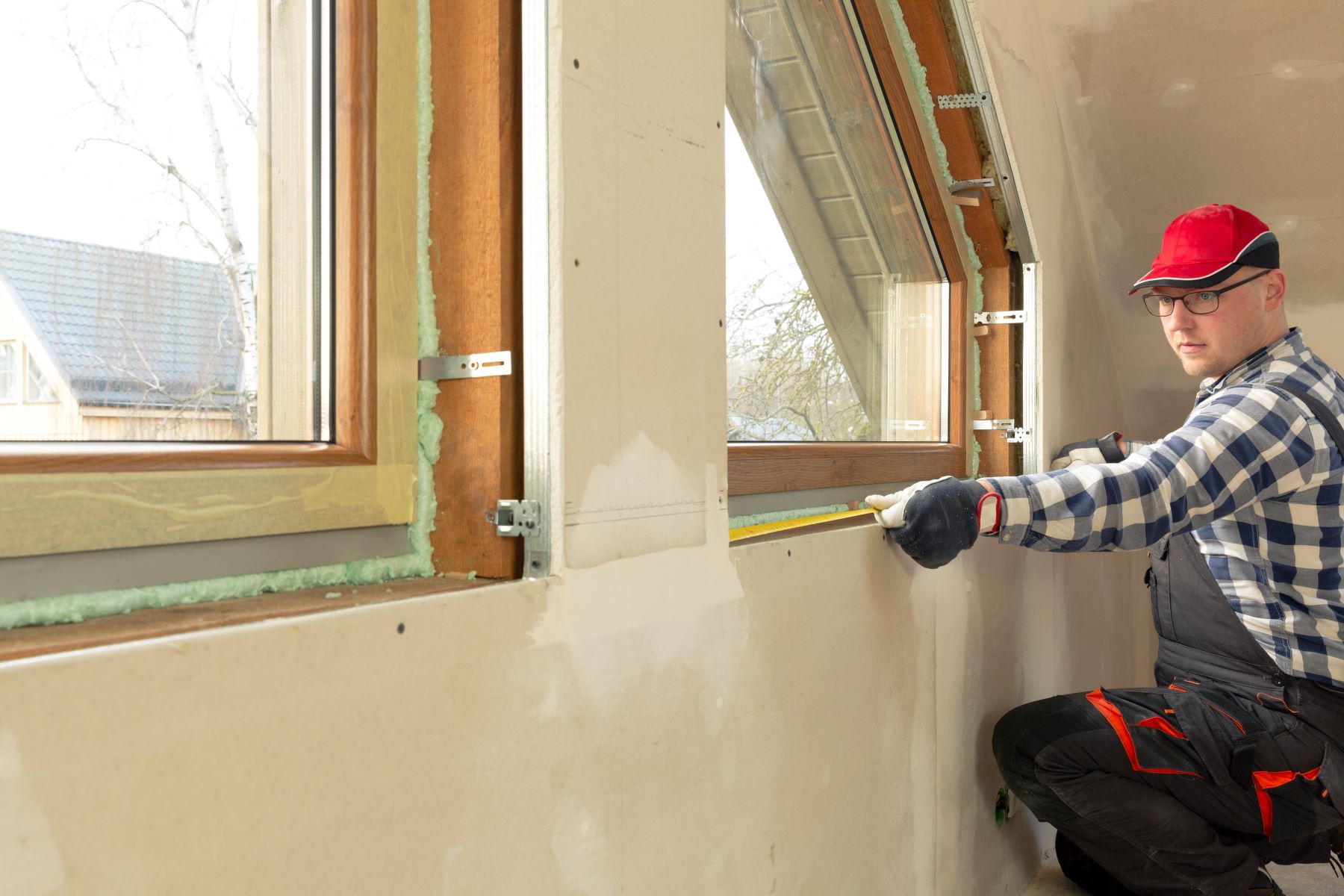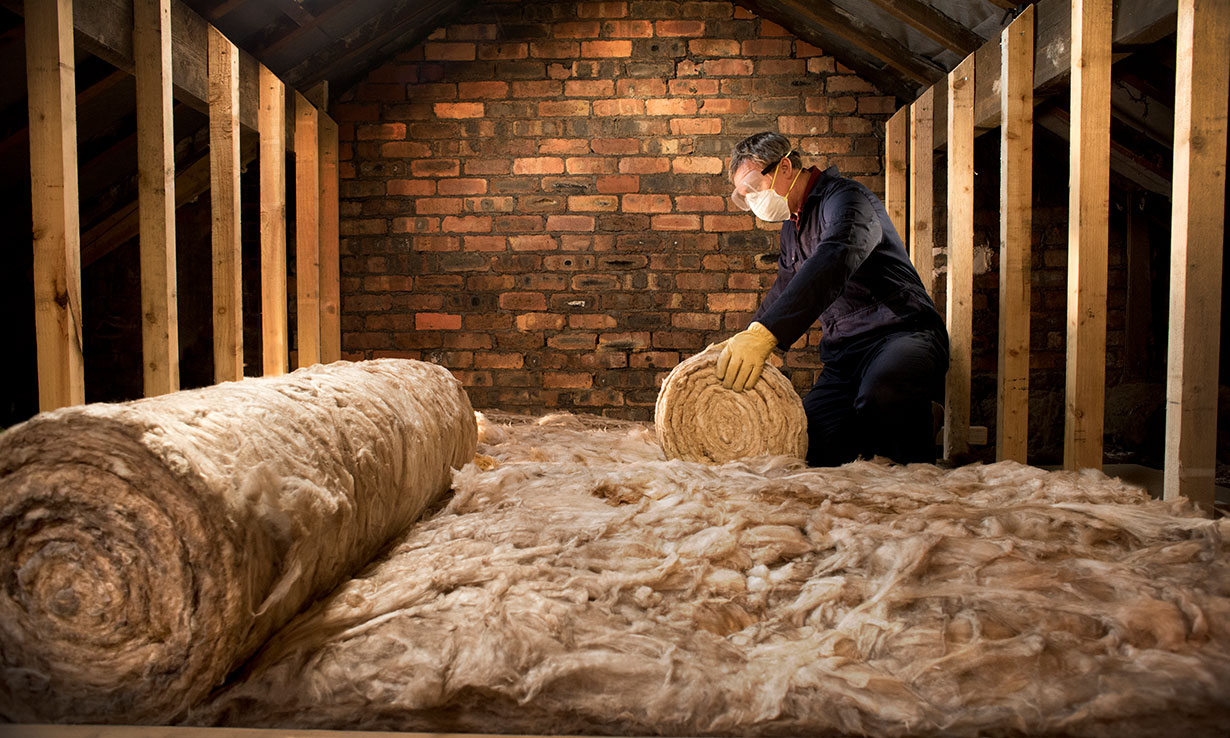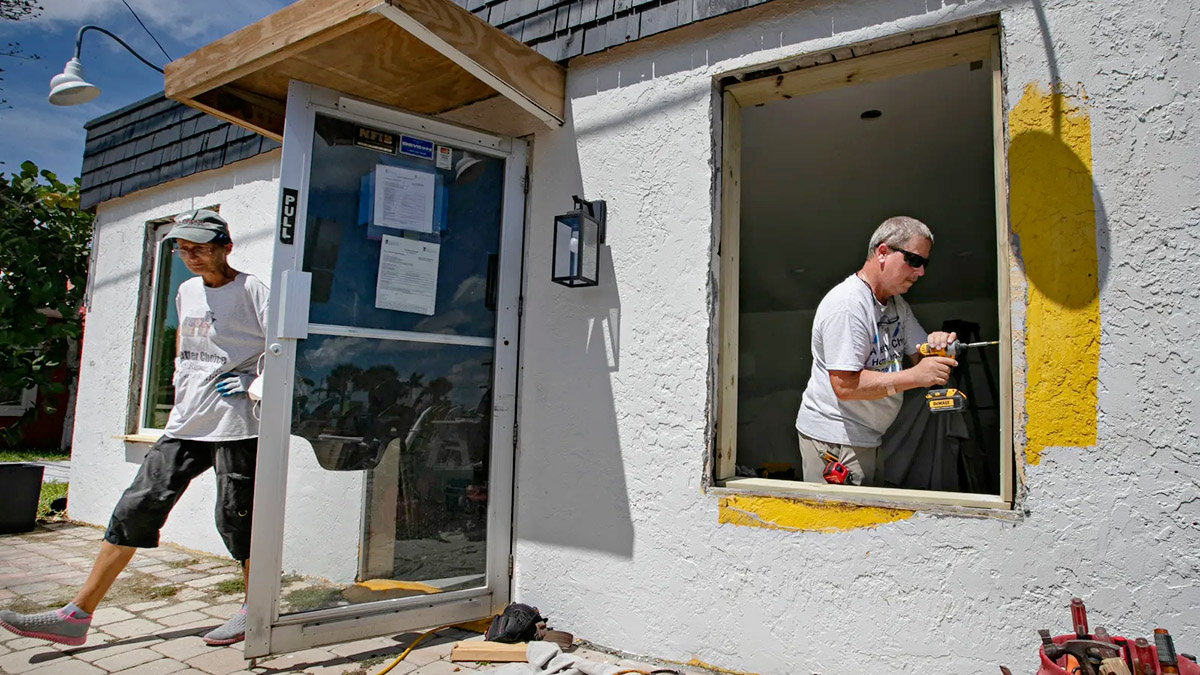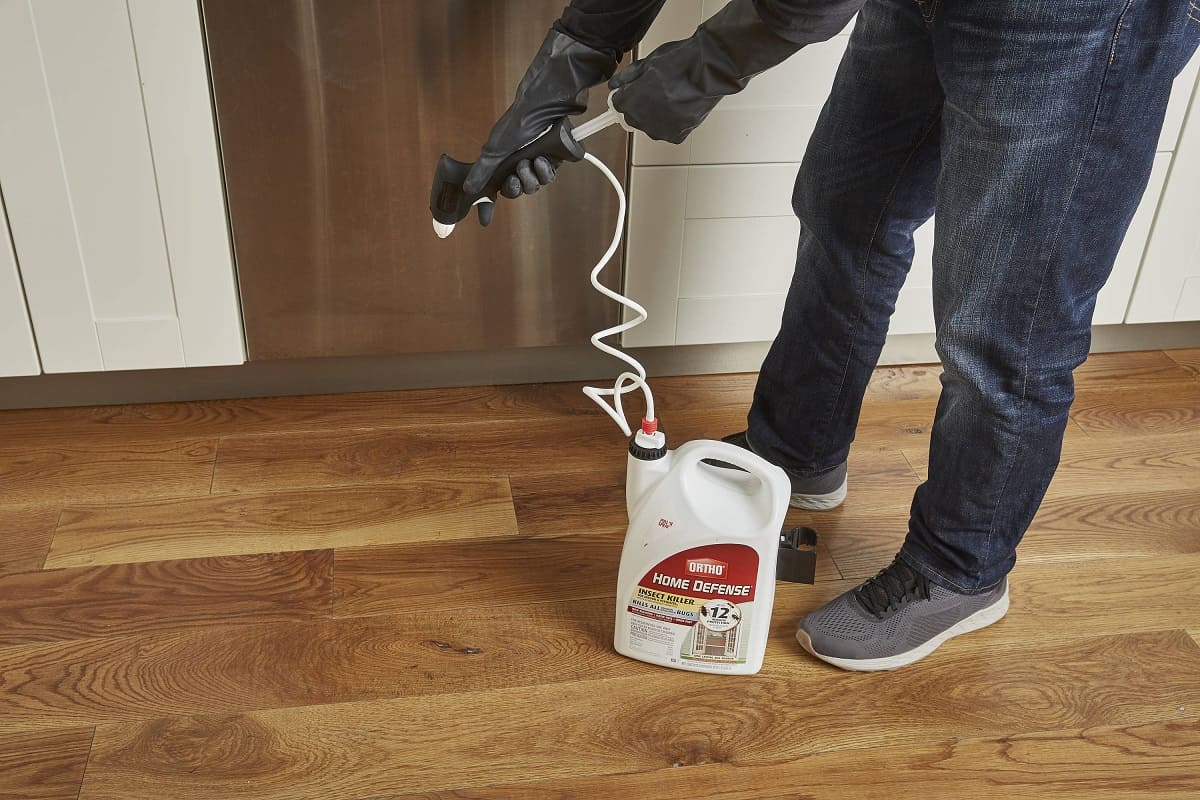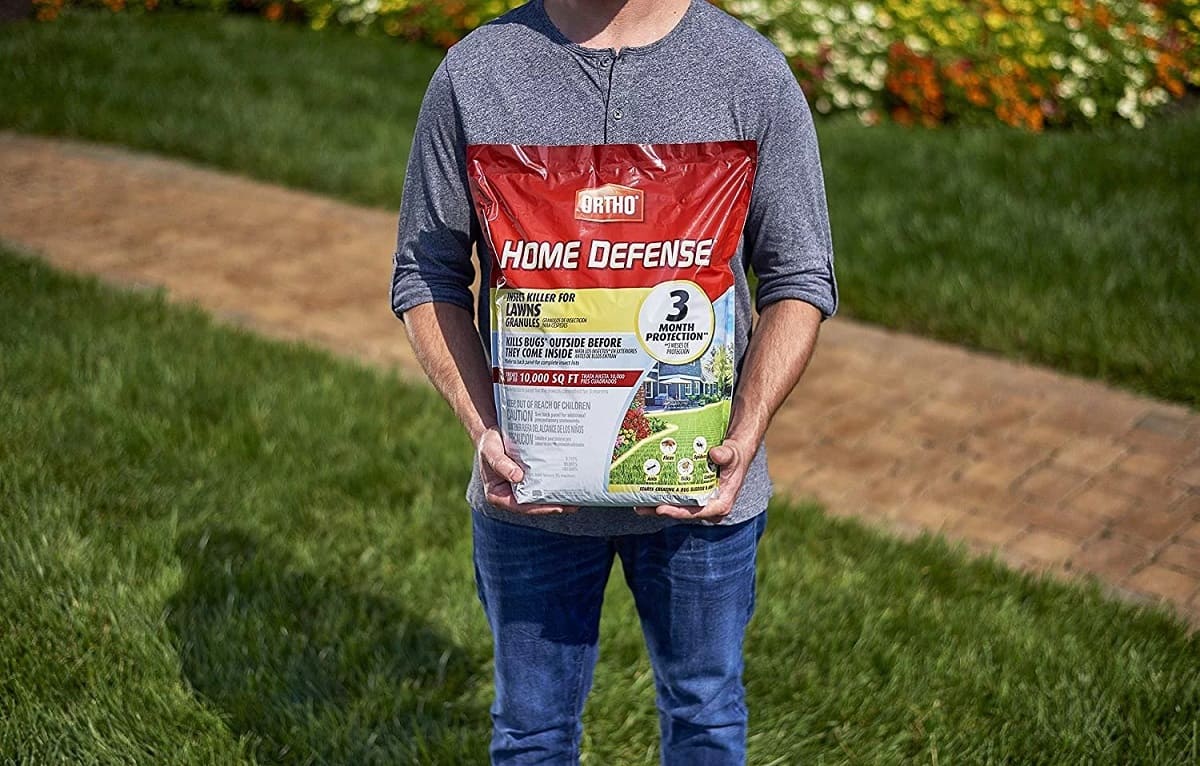Home>Home Maintenance>How To Apply For Home Repair Grants


Home Maintenance
How To Apply For Home Repair Grants
Modified: March 6, 2024
Learn how to apply for home repair grants and get financial assistance for your home maintenance needs. Find out the steps and requirements for obtaining grants in this comprehensive guide.
(Many of the links in this article redirect to a specific reviewed product. Your purchase of these products through affiliate links helps to generate commission for Storables.com, at no extra cost. Learn more)
Introduction
Welcome to the world of home maintenance and repairs – a domain where your house receives the care it deserves. Keeping up with regular maintenance is essential to ensure the longevity and functionality of your home. However, there may come a time when unexpected repair needs arise, requiring immediate attention and financial assistance.
Fortunately, there are various options available to homeowners in need of financial support for home repairs. One of these options is applying for home repair grants. Home repair grants provide funds to eligible individuals to cover the costs of necessary repairs, making it easier for homeowners to maintain the integrity of their properties.
In this comprehensive guide, we will delve into the world of home repair grants. We will discuss the various aspects of these grants, including eligibility requirements, application processes, and how to properly utilize the grant funds.
So, whether you need to repair a leaky roof, fix a broken HVAC system, or address structural issues, this article will equip you with the knowledge to navigate the world of home repair grants and ensure that your home is in optimal condition.
Let’s get started!
Key Takeaways:
- Home repair grants provide free funds for essential home repairs, helping homeowners maintain their properties without worrying about repayment. Eligibility criteria and thorough documentation are crucial for successful applications.
- Researching available grants, gathering required documents, and using the funds responsibly are key steps in securing and utilizing home repair grants effectively. Proper preparation and adherence to guidelines are essential for a successful grant application.
Read more: How To Apply For Grants For Home Improvement
Understanding Home Repair Grants
Home repair grants are financial assistance programs designed to help homeowners cover the costs of necessary repairs and improvements to their properties. These grants are typically provided by government agencies, non-profit organizations, or charitable foundations and aim to support individuals who may not have the financial means to undertake these repairs on their own.
It is important to note that home repair grants are different from loans. Unlike loans, which need to be repaid with interest, grants do not require repayment, making them an attractive option for individuals facing financial constraints.
The types of repairs covered by home repair grants can vary. Some common examples include repairing structural damage, fixing plumbing or electrical issues, replacing a roof, improving accessibility for disabled individuals, or addressing health and safety concerns, such as lead paint removal or mold remediation.
Home repair grants are typically subject to certain eligibility criteria, which we will discuss in more detail later in this guide. It is important to carefully review and understand these criteria to determine if you qualify for a grant.
One key aspect to consider is that home repair grants often have limited funding availability. This means that not all eligible applicants may receive a grant due to budgetary constraints. It is essential to research and stay updated on available grant opportunities and apply as early as possible to maximize your chances of receiving assistance.
Home repair grants aim to support homeowners by ensuring that their properties are safe, functional, and maintained. By addressing necessary repairs, these grants help maintain property values and enhance the overall well-being of the community.
Now that you have a basic understanding of home repair grants, let’s explore the eligibility requirements in the next section.
Eligibility for Home Repair Grants
While home repair grants provide invaluable financial assistance to homeowners, not everyone is eligible to receive these grants. Eligibility criteria vary depending on the specific grant program, but there are some common factors to consider. Here are a few key eligibility requirements to keep in mind:
- Income Level: Many home repair grants have income restrictions, targeting individuals or families with low to moderate incomes. These income limits are set to ensure that the grants are provided to those who need them the most. Make sure to review the income limits for the specific grant program you are interested in.
- Homeownership: Generally, home repair grants are available only to homeowners. If you are renting, you may not be eligible for these grants. However, there are other assistance programs available for renters, so it’s worth exploring those options as well.
- Property Ownership: Grants are typically awarded to homeowners who occupy the property as their primary residence. Vacation homes or rental properties may not be eligible for home repair grants.
- Property Condition: Some grant programs have certain requirements regarding the condition of the property. For example, the property may need to meet certain safety or health standards to be eligible for a grant. It’s important to assess your property’s condition and determine if it meets the necessary criteria.
- Location: Certain grants may have geographic restrictions, focusing on specific areas or communities. These location-based grants aim to revitalize or support underserved neighborhoods or regions. Be sure to check if there are any location-specific requirements for the grant program you are interested in.
It is crucial to carefully review the eligibility requirements for each grant program you consider. This will help you determine if you meet the criteria and whether it’s worth applying for a particular grant.
Additionally, keep in mind that meeting the eligibility requirements does not guarantee that you will receive a grant. Funding availability is a factor that can affect the final decision. Therefore, it’s essential to have realistic expectations and be prepared to explore alternative options if needed.
Now that you understand the basic eligibility requirements, let’s move on to the next section, where we will discuss how to research available home repair grants.
Researching Available Grants
Once you have determined your eligibility for home repair grants, the next step is to research the grants that are available to you. Here are some effective strategies for finding and researching available grants:
- Government Websites: Start your search by visiting government websites at the local, state, and federal levels. These websites often provide detailed information about grant programs, including eligibility criteria, application procedures, and deadlines. Check the housing or community development departments for specific home repair grant opportunities.
- Nonprofit Organizations: Many nonprofit organizations offer grant programs to support homeowners in need. These organizations may focus on specific regions or populations, so it’s important to explore those that align with your circumstances. Research and reach out to local housing or community development nonprofits for potential grant opportunities.
- Online Databases: There are numerous online databases and directories that aggregate information about available grants. These databases often allow you to search by location, eligibility criteria, and even specific repair needs. Some popular databases to consider include Grants.gov, Foundation Center, and your state or local grant databases.
- Community Resources: Reach out to your local community resources, such as housing counseling agencies, community centers, or social service organizations. These organizations may have information about local grant programs or be familiar with other resources that can assist you in your search.
- Word of Mouth: Talk to friends, family, neighbors, or colleagues who may have previously received home repair grants. They can provide insights into their experience, recommend specific grant programs, or point you in the right direction.
As you research available grants, make sure to take note of the grant names, application deadlines, and any specific documentation or forms required for the application process. This information will be vital as you proceed with your grant application.
Remember, grant availability can change over time, so it’s important to regularly check for updates on grant programs and deadlines. Set up alerts, subscribe to newsletters, or follow relevant social media accounts to stay informed about new grant opportunities.
Once you have gathered a list of potential grants, it’s time to move on to the next step: gathering the required documents for your application. We will discuss this in detail in the following section.
Gathering Required Documents
When applying for home repair grants, it’s important to have all the necessary documents ready to support your application. The specific documents required may vary depending on the grant program, but here are some common documents you may need:
- Proof of Ownership: You will typically need to provide documentation that proves you are the owner of the property. This can include a copy of the deed, mortgage statement, or property tax bill.
- Income Verification: Most grant programs require income verification to determine eligibility. You may need to provide recent pay stubs, W-2 forms, or tax returns. Make sure to review the specific income documentation requirements for the grant program you are applying to.
- Property Condition Assessment: Some grants require an assessment of the property condition to determine the repair needs. This can involve a home inspection report, photographs, or a detailed description of the repairs needed.
- Contractor Estimates: Providing estimates from licensed contractors for the repair work can strengthen your grant application. These estimates should outline the scope of the project, materials needed, and the estimated cost of the repairs.
- Personal Identification: You will need to provide a valid form of identification, such as a driver’s license or passport, to verify your identity.
- Supporting Documentation: Depending on the grant program, you may need to provide additional documentation to support your application. This can include letters of recommendation, utility bills, or proof of residency.
It’s crucial to carefully review the documentation requirements for each grant program and ensure that you have all the necessary documents in order. Missing or incomplete documentation can delay the processing of your application or even result in rejection.
Consider creating a checklist to keep track of the required documents and mark them off as you gather them. This will help ensure that you have everything prepared and organized when it’s time to submit your application.
Now that you have gathered all the required documents, it’s time to move on to completing the application. We will explore this process in detail in the next section.
Completing the Application
Completing the application for a home repair grant is a crucial step in the process. It’s important to carefully and accurately fill out the application to maximize your chances of approval. Here are some tips to help you complete the application successfully:
- Read the Instructions: Before you start filling out the application, thoroughly read and understand the instructions provided. Each grant program may have specific guidelines, formatting requirements, or sections to complete. Following the instructions diligently will ensure that your application is complete and meets the necessary criteria.
- Provide Accurate Information: It’s essential to provide accurate and truthful information on the application. Double-check your personal details, contact information, and financial information to avoid any errors. Any inconsistencies or false information can result in the rejection of your application.
- Explain the Repair Needs: Clearly explain the repair needs and the reasons why you require financial assistance. Provide a detailed description of the repairs needed and how they impact the safety or functionality of your home. Be specific and use supporting documentation or photographs if applicable.
- Include Supporting Documentation: Attach the required supporting documents to your application as specified by the grant program. Make sure to organize the documents in the order requested and label them appropriately. This will help streamline the review process and provide a complete picture of your situation.
- Follow Formatting Guidelines: Some grant applications may have specific formatting guidelines, such as font size, margins, or document type. Adhering to these guidelines demonstrates your attention to detail and professionalism. Failure to comply with formatting requirements may result in your application being rejected.
- Proofread and Review: Before submitting your application, thoroughly proofread it for any spelling or grammatical errors. Review the application to ensure that you have completed all the sections accurately and included all the necessary information and supporting documents. It may be helpful to have someone else review your application as well to catch any overlooked mistakes.
Once you have completed and reviewed your application, make a copy of the entire application package for your records. This will serve as a reference in case any questions or issues arise during the review process.
Now that your application is complete, it’s time to move on to the next step: submitting the application. We will discuss this process in detail in the following section.
When applying for home repair grants, make sure to thoroughly research the eligibility requirements and application process for each grant program. It’s important to provide all necessary documentation and follow the instructions carefully to increase your chances of approval.
Submitting the Application
Submitting your completed application for a home repair grant is the final step before the review process begins. It’s important to carefully follow the submission guidelines to ensure that your application is received and processed correctly. Here’s what you need to know about submitting the application:
- Review Submission Instructions: Take the time to review the submission instructions provided by the grant program. This may include details on how and where to submit the application, whether it’s online, through email, or by mail. Pay attention to any specific formatting requirements or additional documentation that needs to be included.
- Organize Your Application Package: Assemble your application package with all the required documents in the order specified. Keep everything organized and secure, making sure that the documents are easily accessible and properly labeled. This will help streamline the review process and ensure that nothing is missing.
- Submit Before the Deadline: Be mindful of the application deadline and submit your application well in advance to avoid any last-minute complications. Late applications are typically not accepted, so it’s important to plan accordingly and allow for sufficient time for submission.
- Confirm Receipt: If possible, request a confirmation of receipt from the grant program once you have submitted your application. This will provide you with peace of mind and serve as proof that your application was received. If confirmation is not provided, consider following up with the grant program to ensure they have received your application.
- Keep Copies of Your Application: It is crucial to keep a copy of your entire application package for your records. This includes a copy of the completed application form, supporting documents, and any confirmation of receipt received. Having these copies handy will be helpful in case of any inquiries or follow-ups.
By carefully following the submission instructions and ensuring that your application package is complete and organized, you increase your chances of a smooth and successful submission process.
After submitting your application, it’s time to wait for the review process to take place. In the next section, we will discuss what to expect during the waiting period and the potential outcomes of your application.
Waiting for Approval
Once you have submitted your home repair grant application, it’s time to enter the waiting period. The waiting period can vary depending on the grant program and the number of applications received. Here’s what you can expect during this time:
- Patience is Key: Waiting for the approval or denial of your application can be an anxious period. It’s important to stay patient and avoid contacting the grant program regarding the status of your application unless instructed to do so. Most programs have specific timelines for review and will notify you of any updates or decisions.
- Review and Evaluation: During the waiting period, the grant program will review and evaluate your application. This may involve a thorough analysis of your eligibility, documentation, and the extent of repair needs. The review process ensures fairness and adherence to program guidelines.
- Notification of Decision: Once the review process is complete, you will receive notification of the decision regarding your application. This can be in the form of an acceptance or denial letter or email. The notification will provide information on the status of your application and further instructions if applicable.
- Possible Outcomes: There are several potential outcomes for your application. You may receive full approval and be granted the funds for your repair needs, partial approval with a stipulated funding amount, or your application may be denied. If denied, the notification will usually provide reasons for the denial and potential next steps to consider.
- Follow-up Actions: Depending on the outcome of your application, there may be follow-up actions required. This can range from providing additional documentation or clarification to appealing the decision if you believe there has been an error or a change in circumstances. Carefully review the notification and follow the instructions provided.
While waiting for the approval or denial, it’s important to explore alternative options for funding or assistance. Consider researching other grant programs, low-interest loans, or community resources that may be available to support your home repair needs. It’s always wise to have a backup plan in case the grant application is not successful.
Remember, grant programs often have limited funding availability, and not all eligible applicants can be awarded grants. If your application is not approved, don’t be discouraged. Explore other avenues of financial assistance and continue to maintain your property to prevent further damage or deterioration.
Now that you know what to expect during the waiting period, let’s move on to the next section, which covers what happens once you receive the grant funds.
Receiving the Grant Funds
Congratulations! You’ve been approved for a home repair grant, and now it’s time to receive the grant funds. The process of receiving the funds will vary depending on the grant program and their specific procedures. Here’s what you can expect:
- Notification of Approval: Upon approval of your grant application, you will typically receive a notification informing you of the approved amount and any conditions or restrictions associated with the grant funds. This notification may come in the form of a letter or email.
- Grant Disbursement: The grant program will outline the disbursement process for the funds. This can vary, but commonly, the funds may be disbursed directly to you as the homeowner or may be sent directly to the contractor performing the repairs. It’s important to follow the instructions provided by the grant program to ensure a smooth disbursement process.
- Timelines for Use: The grant program may specify a timeline or deadline by which the grant funds must be used. This helps ensure that the funds are utilized for their intended purpose within a reasonable timeframe. Be sure to review and understand any timelines associated with the grant so that you can plan your repairs accordingly.
- Required Documentation: The grant program may require documentation to be submitted after the repairs are completed to provide evidence of the work done. This can include invoices, receipts, or signed completion forms from the contractor. Make sure to keep proper records of all repair-related documentation to comply with the requirements of the grant program.
- Compliance Audits: Some grant programs may conduct compliance audits to ensure that the grant funds were used appropriately. This can involve inspections or requesting additional documentation to verify that the repairs were completed as stated in the application. It’s important to be prepared for any potential audits and provide any requested information in a timely manner.
- Using the Funds: When using the grant funds, it’s crucial to follow the guidelines set by the grant program. The funds should be used solely for the approved repairs and should not be diverted for other purposes. Properly managing the grant funds ensures compliance with the grant program and helps maintain the integrity of the assistance provided.
As you start using the grant funds for your home repairs, it’s important to maintain open communication with the grant program. If there are any changes or unforeseen circumstances that impact your repairs or ability to adhere to the grant program’s requirements, notify them promptly and seek guidance on how to proceed.
Remember, proper documentation and record-keeping are essential throughout the process, from receiving the funds to completing the repairs. Keep copies of all related documents, including contracts, invoices, and receipts, as they may be requested during compliance audits or for record-keeping purposes.
Now that you understand what to expect when receiving the grant funds, let’s conclude our guide on home repair grants in the next section.
Using the Grant Funds Appropriately
When you receive a home repair grant, it’s important to use the funds appropriately and responsibly. Adhering to the guidelines set by the grant program ensures the integrity of the assistance provided and ensures that the funds benefit the intended purpose. Here are some key considerations for using the grant funds appropriately:
- Stick to the Approved Repairs: The grant funds should be used solely for the approved repairs outlined in the grant application. Deviating from the approved scope of work can lead to complications and potential issues with the grant program. If there are any changes or unforeseen circumstances that require adjustments to the repairs, communicate with the grant program and receive proper approval before proceeding.
- Engage Qualified Contractors: When hiring contractors for the repair work, ensure that they are qualified and licensed professionals who have experience in handling the specific repairs needed. Properly vetting contractors helps ensure that the grant funds are used efficiently and effectively, resulting in quality repair work.
- Obtain Multiple Quotes: It’s advisable to obtain multiple quotes from contractors to compare costs and ensure that you are getting a fair price for the repair work. This helps maximize the value of the grant funds and ensures that you are not overpaying for the repairs.
- Keep Detailed Records: Maintain a thorough record of all transactions related to the repair work. This includes contracts, invoices, receipts, and any other relevant documentation. Proper record-keeping helps demonstrate the appropriate use of the grant funds and may be required for compliance audits or reporting purposes.
- Ask for Documentation: When making payments to contractors, always request detailed invoices that clearly outline the services provided and the associated costs. This documentation provides evidence of the work completed and helps validate the use of the grant funds.
- Complete the Repairs Timely: It’s important to complete the approved repairs within the designated timeline specified by the grant program. Delaying the repairs without valid reasons may result in complications with the grant program and could potentially affect your eligibility for future grant assistance.
By using the grant funds appropriately and responsibly, you uphold the integrity of the assistance provided and contribute to the successful outcomes of the grant program. The proper use of the funds helps maintain transparency, accountability, and ensures that deserving applicants continue to receive assistance in the future.
Remember to stay in communication with the grant program throughout the repair process. If you encounter any issues or need guidance, reach out to the program representative for clarification and support. They are there to assist you and ensure that the grant funding is utilized effectively.
Now that you understand the importance of using the grant funds appropriately, let’s wrap up our comprehensive guide on home repair grants.
Conclusion
Home repair grants provide invaluable financial assistance to homeowners in need of essential repairs and improvements. By understanding the world of home repair grants, eligibility requirements, and the application process, you can navigate this opportunity for financial support effectively.
Throughout this guide, we explored the various aspects of home repair grants. We discussed the importance of regular maintenance and the role that grants play in helping homeowners maintain the integrity and functionality of their properties. We also highlighted the eligibility requirements, emphasizing the need to meet income levels, property ownership criteria, and other necessary qualifications.
We delved into researching available grants, emphasizing the significance of exploring governmental websites, nonprofit organizations, online databases, and community resources. By utilizing these sources, you can discover opportunities that align with your specific circumstances and repair needs.
Preparation is key when applying for home repair grants, and we provided insights into gathering the required documents and completing the application. Attention to detail, accuracy, and providing supporting documentation significantly increase your chances of success.
After submitting your application, we discussed the waiting period and the importance of staying patient. Understanding potential outcomes and having alternative funding options in mind ensures that you can proceed with your repair plans effectively.
Receiving the grant funds requires responsible usage. We emphasized sticking to approved repairs, engaging qualified contractors, obtaining multiple quotes, and keeping thorough records. By using the grant funds appropriately, you contribute to the effectiveness and sustainability of the grant program.
In conclusion, home repair grants offer a lifeline to homeowners facing financial constraints in addressing necessary repairs. By familiarizing yourself with the process, eligibility requirements, and guidelines, you can navigate this opportunity with confidence and secure the financial assistance you need to maintain your home’s safety, functionality, and overall well-being.
Remember, each grant program may have its specific requirements and processes, so it’s important to do additional research and thoroughly review the guidelines of the specific grants you’re interested in. By staying informed and proactive, you can successfully benefit from home repair grants and keep your beloved home in excellent shape for years to come.
Frequently Asked Questions about How To Apply For Home Repair Grants
Was this page helpful?
At Storables.com, we guarantee accurate and reliable information. Our content, validated by Expert Board Contributors, is crafted following stringent Editorial Policies. We're committed to providing you with well-researched, expert-backed insights for all your informational needs.

